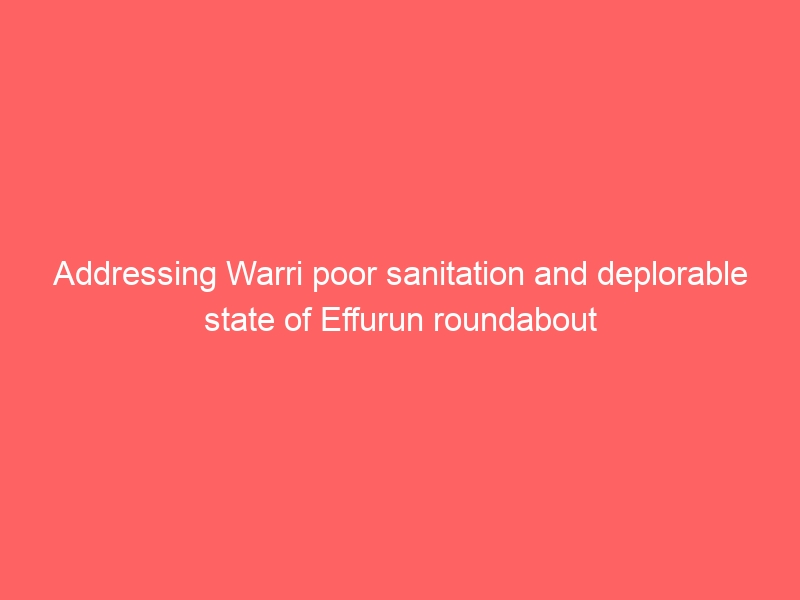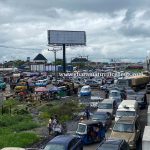Addressing Warri poor sanitation and deplorable state of Effurun roundabout
By Jerome-Mario Chijioke Utomi
Going by recent commentaries about the oil rich city of Warri, the economic life wire of Delta state, it is evident that a once organized town has finally lost its battle to poor sanitation, environmental pollution and deplorable road network.
Out of many examples of such reports/comments, two stemmed this piece. First is an investigative account, Titled; Warri NPA Waterside: Where Poverty and Pollution Reigns Supreme, by GbaramatuVoice, a leading multimedia organization based in Warri, and focused on poor state of sanitation/environmental pollution of two commercial points in warri metropolises – (NPA waterside and Sand fill 2 (Warri Corner), Warri South and Warri West Local Government Areas of the state respectively. Concluding that except something theatrical is done to arrest the situation, the once bustling city, which formerly prides itself as the second most sought tourist destination in the whole Niger Delta region, after Port Harcourt, may be preparing to play host to epidemic and other communicable diseases.
The second stemmed from another statement, this time around, from the Nigerian Bar Association (NBA) Warri branch, signed by the Chairman, Chief Oghenero Okoro and Secretary, S.G. Ediagbonuvie, Esq, it states in part; “the very bad and deplorable state of the Effurun Roundabout, Effurun, is not only worrisome but embarrassing”, urging the state government to declare a state of emergency on the failed portions and save Deltans and motorists from untold hardship posed by the dangerous scenario’.
Beginning with the referenced poor sanitation situation in the city, aside from ringing apprehension of outbreak of epidemic and other communicable diseases in the state, it more than anything else, in my view signals how the people of the Niger delta region now suffer pollution from dual sources.
First and very ‘traditional’ is the pollution resulting from crude oil exploration and production in the region and exacerbated by the inability of the regulatory agencies to monitor, check, deter or punish offenders. Another that is nascent but acute stems from this reported refuse dump, majorly made up of plastic products and other delicate waste products that are harmful to human health daily dumped into surrounding and adjourning rivers which sadly provides daily water needs of the resident as a result of the state failed water projects.
There is also an account which says that Nigeria has about 139 gas flare locations across the Niger Delta, and a similar report added that Nigeria is a country with the highest burden of fatalities from air pollution in Africa and 4th globally-with pollution now responsible for the death of 150 per 100,000 Nigerians; a position that barefacedly revealed that the nation’s environment like Warri city is sick and the ecosystem troubled.
If this line of reasoning is correct, it will necessitate the posers as to; how long would deltans stand this test? Or must they allow such grief like good and evil go on together allowing residents to reap whatever fruit that comes from such situations? Which level of government is in charge of ensuring environmental sanitation in the city; Local Government authorities, state or the Federal Government?
While answer (s) to the above questions is awaited, it is important to underline that there are two reports that makes the urgent need for action against environmental degradation/pollution a compelling excurse.
The first says that plastic pollution has become endemic to our environment in recent times; revealing that about 500 billion plastic bags are produced every year, with more plastic produced in the last decade exceeding that of the last century; that about 1 million plastic bottles are purchased every minute in addition to the world’s usage of 500 million plastic bags each year, with at least 8million tonnes of plastics ending up in the ocean- an equivalent of a full garbage truck every minute.
The second is Nigeria specific. It has to do with unimaginable volume of crude oil that are daily, in the name of crude oil exploration and exploration emptied into the surrounding Niger delta region resulting in pollution, degradation and destruction of aquatic lives.
According to latest data from the National Oil Spill Detection and Response Agency (NOSDRA), that recorded a total of 4,486 cases of oil spill, amounting to 242,193 barrels of oil, from 2015 to 2021. The reported figure of oil spill cases is equivalent to 38.5 million litres of crude loss, representing an average of about 62 cases and 3,362 barrels of oil spills in a month, per data from NOSDRA’s satellite website on April 16. Making it a reality to worry about is that the same way rivers, lagoons, seas and oceans are daily polluted by human activities, even so has the government at all levels failed to device an environmental remediation roadmap that is both achievable and sustainable.
Very important also, the key for the solution to the challenge, it has become eminently desirable that residents takes a cue from countries like China, Germany, and Rwanda who are among the world’s leading recyclers of waste and cutting down the use of plastic. Nigeria must move from the open landfills in every state of the country that has become eyesores to generating wealth from the recycling of these wastes.
Arresting these monsters will also require both the state and Federal Government to among other things embrace, and work towards total environmental remediation of dastardly devastated Niger delta region through ecological rehabilitation and environmental resuscitation, adopt a coherent and friendly oil and gas policy that comprehensively enumerates oil companies responsibilities to the environment and host communities, focus on environmental protection and pollution control
In the same line of thinking, the nation policy makers must jettison payment of lip service to, but activate positive action that will appreciate the 2030 sustainable agenda which was formulated to among other aims promote and carter for people, peace, planet, and poverty
As to the current state of the road in warri city, this piece calls on the state Government to recognize that infrastructure enables development and also provides the services that underpin the ability of people to be economically productive. “The transport sector for example has a huge role in connecting populations to where the work is,” says Ms Marchal. Infrastructural investments help stem economic losses arising from problems such as power outages or traffic congestion. The World Bank estimates that in Sub-Saharan Africa closing the infrastructure quantity and quality gap relative to the world’s best performers could raise GDP growth per head by 2.6% per year.
This is an important issue Governor Okowa led administration in the state and of course the Federal Government must not to allow go with political winds unaddressed.
Utomi of Social and Economic Justice Advocacy (SEJA), Lagos, writes via: Jeromeutomi@yahoo.com/08032725374.












